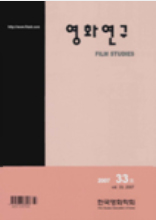- 영문명
- The Changes of Political Power and Cinema: Soviet Cinema during the Khrushchev Thaw(1956~1966)
- 발행기관
- 한국영화학회
- 저자명
- 정태수
- 간행물 정보
- 『영화연구』제33호, 201~236쪽, 전체 36쪽
- 주제분류
- 예술체육 > 예술일반
- 파일형태
- 발행일자
- 2007.09.30

국문 초록
영문 초록
This paper presents the trends of films during the Khrushchev Thaw and aims to examine the relationship between the changes of political power and emerge of a new method of film creation. In the history of Soviet cinema, the Khrushchev Thaw means its critical and methodological changes carried by the films produced from 1956 to 1966. The political change of the Khrushchev Thaw did not emerge until Khrushchev became first secretary of the Central Committee and denounced Stalin's brutal despotism in his famous “secret speech” before the Twentieth Party Congress in February 1956. Khrushchev's changes against his former boss ranged from self-glorification to political mass murder, and he roundly indicted Stalin's promulgation of a “cult of personality”. It is significant to note that Khrushchev's de-stalinization had a huge impact on artists. Khrushchev emphasized the return to Marxism and Leninism. It concludes that in the cinema during Khrushchev Thaw there appeared a lot of film describing Lenin's life and activities and characters embodying Marxism-Leninism. In addition, this paper presents that films in those days emphasized an individual and reality in one's life. These new methods of film-creation during Khrushchev Thaw was a result of in-depth examination and description on an individual and reality which was repressed in Stalin regime. In conclusion, this paper show that political changes carried by de-stalinization process caused the emergence of new methods of film-creation during Khrushchev Thaw.
목차
1. 흐루쇼프의 20차 전당대회
2. 사회주의 리얼리즘의 미학적 법칙의 변화
3. 해빙기의 소비에트 영화
4. 결론
키워드
해당간행물 수록 논문
참고문헌
최근 이용한 논문
교보eBook 첫 방문을 환영 합니다!

신규가입 혜택 지급이 완료 되었습니다.
바로 사용 가능한 교보e캐시 1,000원 (유효기간 7일)
지금 바로 교보eBook의 다양한 콘텐츠를 이용해 보세요!



